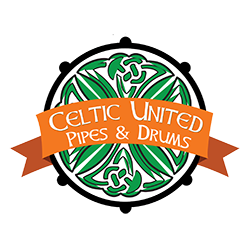Instruction
Celtic United Pipes & Drums is open to people at all levels of musical training who are interested in piping and drumming.
Where do I go to learn?
We meet regularly, every Monday night, at Plainfield Township Volunteer Fire Company, 6480 Sullivan Trail, Wind Gap, Pa. at 7:00 PM (check before coming to make sure there hasn’t been a scheduling change). The first hour is set aside for students the 1st and 3rd Mondays of each month. The remainder of the evening is for the band’s regular rehearsal, which is usually over by 9:00 PM. Students are welcome to stay for the whole evening.
Aspiring Pipers:
What do I need to get started?
Learning to play the bagpipe will be the most rewarding and frustrating experience of your life.
The bagpipe is first learned on the practice chanter. The chanter is used throughout your piping career for fingering practice and to learn new tunes. Depending on ability and commitment, the beginner will play the practice chanter for six months to one year, or longer, before he/she is ready to play the bagpipes. A tutorial is also needed to guide you through the learning process.
The practice chanter you purchase should be made of plastic/polypenco. The “standard length” is usually preferred over “full length”. Countersunk finger holes make it easier to find the correct finger position. The chanter should come with at least one plastic reed. Acceptable brands of chanters include D. Naill, Dunbar, Warmac, or McCallum.
Purchase the Sandy Jones-Beginning the Bagpipe, tutor and cassette, or, the College of Piping Book #1 and cassette. Another great learning resource manual is the “How To Manual for Learning to Play The Great Highland Bagpipe” by Major Archie Cairns, CD of London, Ontario, Canada. This manual comes with a CD of Major Cairns playing and describing key chapters of his manual.
How much should I expect to spend?
Tutor: Approximate Cost – $34.00
Practice Chanter: Approximate Cost – $75.00
Bagpipes: Approximate Cost: $800 – $2500
(do not purchase bagpipes before consulting with the band)
Aspiring Drummers
What do I need to get started?
The first thing a drummer needs is a good sense of rhythm!
Drums are first learned on a practice pad, which will also be used throughout your career when learning new pieces or to practice without driving your family crazy! Drummers graduate to the actual drum based solely on ability – generally between six months to a year for students new to drumming and music in general. A tutorial is also needed to guide you through the rudiments. We recommend Doug Stronach’s Pipe Band Snare Drum Tutor, volume 1 with the CD.
The practice pad you purchase should be made specifically for pipe band drummers (Medium Cameron Practice Pad). Preferred drum sticks are the KP2 Kilpatrick Snare Sticks. It is also advisable to purchase an electronic metronome, which can be purchased at any music store.
How much should I expect to spend?
Tutor: Approximate cost – $40
Practice Pad: Approximate Cost – $35
Drums Sticks: Approximate Cost – $20
Metronome: Approximate Cost – $30
Snare Drum: The drums are owned by the pipe band and are checked out to qualifying drummers.
